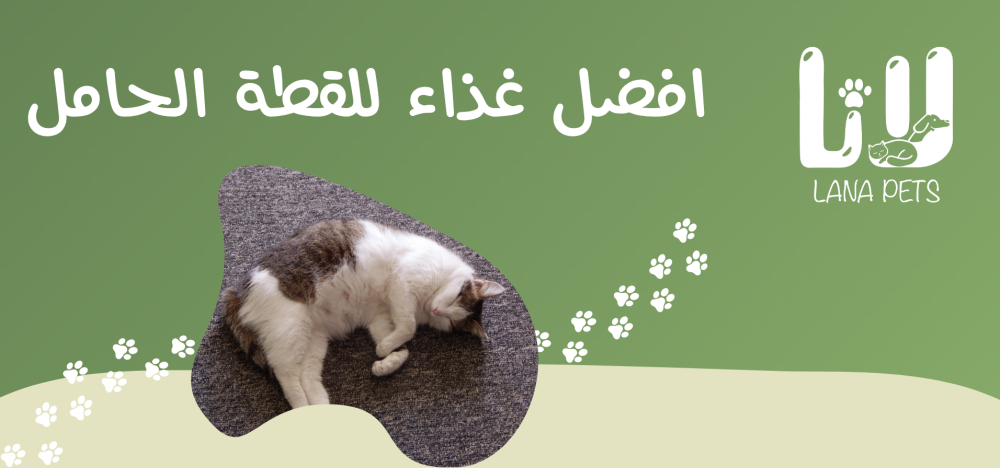
Any pregnant female pet needs a special diet to ensure that the mother and her kittens get enough nutrition to stay healthy during pregnancy. If your cat is expecting kittens, what nutritional considerations does she need to make to have a healthy mother and baby? Learn with us about the best food for pregnant cats and the most important tips for a healthy diet from Lana Pets. We also provide a group of the best foods for pregnant and nursing cats.
The best food for a pregnant cat and why is the right diet important during pregnancy?
Female cats are sexually mature enough to become pregnant at 4 to 6 months of age, and because their fertility status does not change with age, they may carry kittens throughout their lives. Older cats have higher-risk pregnancies with greater risks to both mother and developing kittens, and cats who are pregnant for the first time are also at greater risk of complications.
A cat's gestation period ranges from 58 to 72 days, depending on the cat's breed, age, health, activity levels, litter size, and previous pregnancies. It can be difficult to pinpoint the exact date of delivery for a cat, as early pregnancy symptoms are very subtle and may not be noticed right away.
Cats generally have 3 to 5 kittens at a time, although litter sizes of 1 to 12 or more can occur. Larger litters are more common with purebred cat breeds such as Siamese, while Persian breeds tend to have smaller litters.
Therefore, a nutritious and healthy diet that includes the best food for pregnant cats is essential for pregnant cats. A good diet will support the health of the mother as well as the health and development of her unborn kittens. On the other hand, malnutrition can lead to stillbirth, low birth weight for kittens, growth problems, decreased milk production, and other difficulties. A malnourished mother cat may suffer more complications during labor and delivery, and will not be prepared to care for any surviving kittens.
Best diet for pregnant cat
Once you notice that your cat is pregnant, it is essential to switch to a healthy diet during pregnancy. Kitten foods or growth and development formulas are best, such as:
Lana Pets wet cat food will provide better overall nutrition for pregnant cats. The best food for pregnant cats will include:
- Protein to support kittens' growth and development.
- Calcium and phosphorus for bone health and milk production.
- Added fat content to provide increased energy for the mother cat.
- Less carbohydrates, so less food is passed as indigestible waste.
- Highly digestible, so the mother cat gets more nutrition from a smaller amount of food.
- Wet food is often preferred over dry cat food to feed a pregnant cat, as it will not only be easier to digest and more likely to have a healthier nutritional content, but the added moisture will also help the cat stay hydrated. Ideally, the food should contain real meat as the first ingredient, and there should be no fillers in the overall composition of the food.
How to change your cat's diet to the best food for pregnant cats
If your cat's diet needs to change to suit her pregnancy nutritional needs, it's best to change her food slowly over a period of 7 to 10 days. This will minimize any digestive upset or additional stress, helping your cat adjust to the new taste or texture more easily.
Ideally, a cat should be fed small meals more frequently during pregnancy. This is especially important later in pregnancy, when kittens take up more space in the cat’s belly, leaving less room for larger meals that will be difficult to digest quickly. If a cat is having trouble eating, leaving more food available can allow the cat to snack as needed, but overall food intake should be closely monitored.
Unless recommended by your veterinarian, it is not necessary. A kitten supplement will be adequate for the mother’s nutritional needs, and additional supplements may cause complications during pregnancy. Calcium supplements, for example, can lead to eclampsia after the kittens are born, which can significantly affect the mother cat’s behavior and ability to care for her kittens. If your cat had known nutritional problems or special dietary needs prior to pregnancy, it is best to consult your veterinarian to determine if supplements or other special foods may be necessary.
Avoid overfeeding.
You might think that a pregnant cat should be eating as much food as possible, but it is important to avoid overfeeding her during pregnancy. An overweight cat is more likely to have pregnancy complications and give birth to a larger litter of kittens, as well as decreased milk production and potential health problems for the mother cat later in life, especially if the weight is not lost after pregnancy. Weighing your cat weekly during pregnancy will not only give you a clue that she is at an appropriate weight, but it can also help gauge the development of the kittens.
A healthy diet that includes the best food for pregnant cats during pregnancy is essential for both the mother cat and her unborn kittens. Understanding the nutritional needs of cats and dietary considerations during pregnancy can help any cat owner ensure that their cat is healthy and well-nourished during pregnancy.
In conclusion, you now know what the best food for pregnant cats should include and what is the correct diet that your cat should follow during pregnancy, for a healthy pregnancy and healthy kittens. Get the best cat foods now from Lana Pets store with the highest quality and help your cat enjoy perfect health for her and her kittens.

